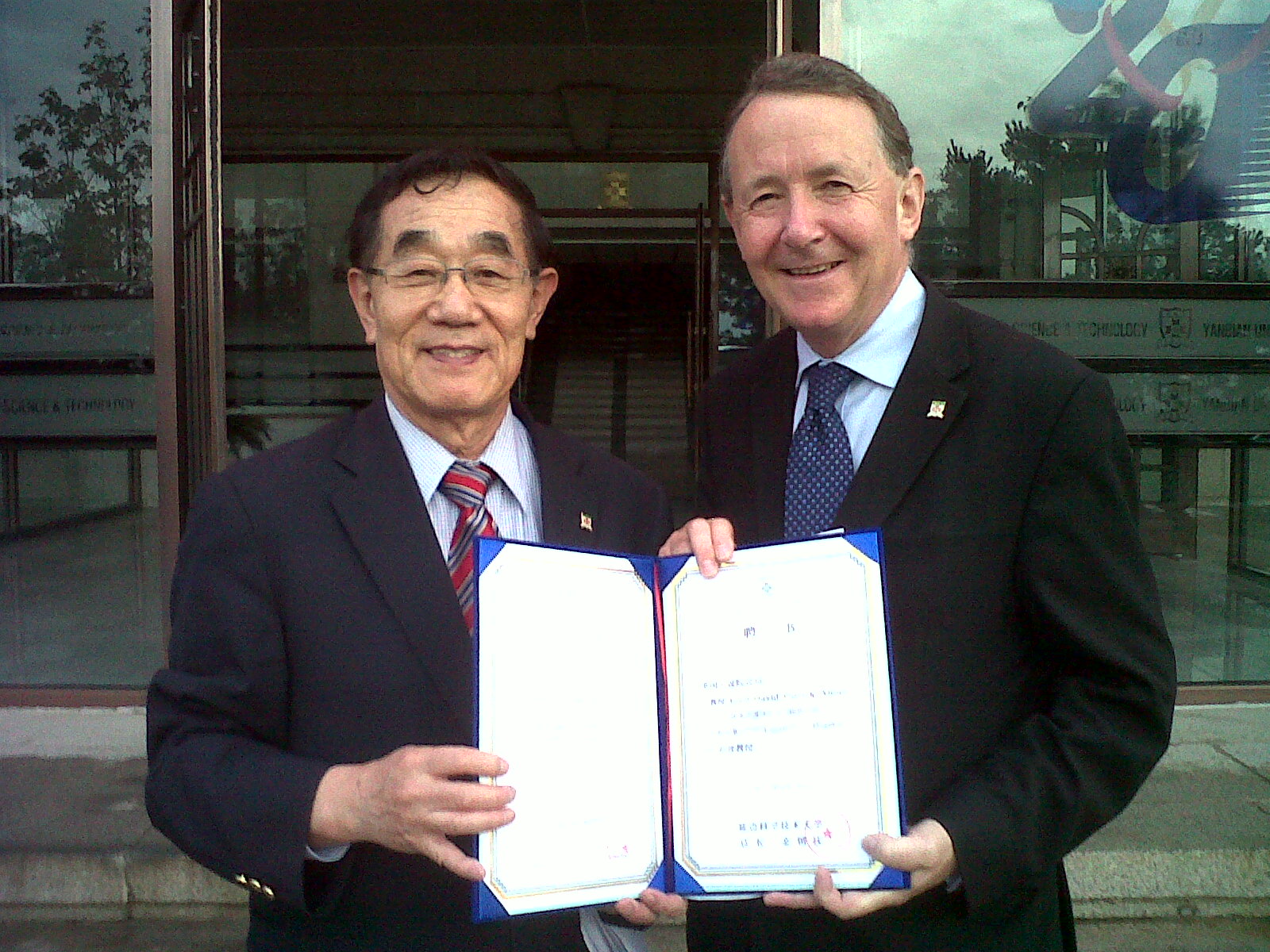
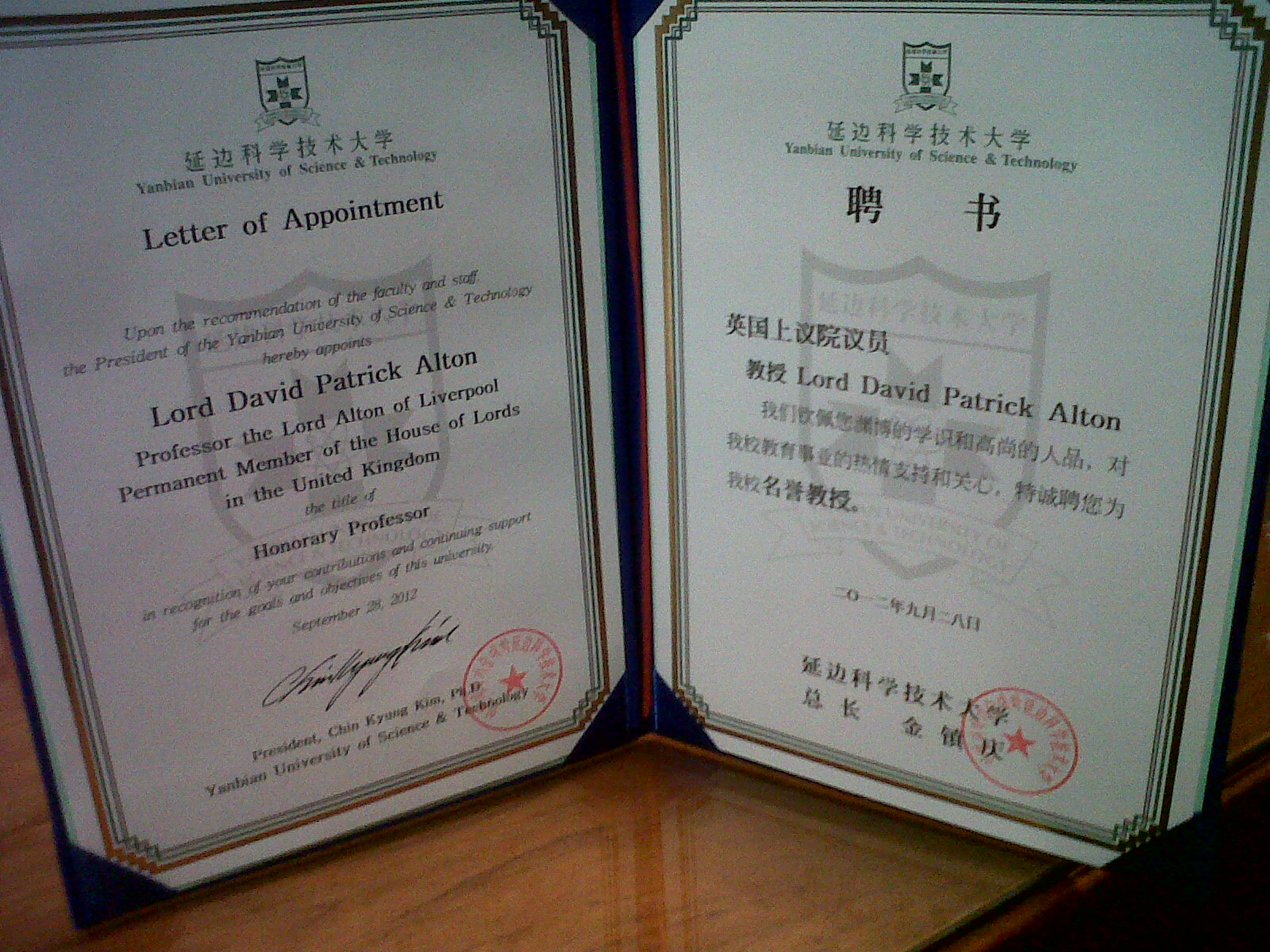
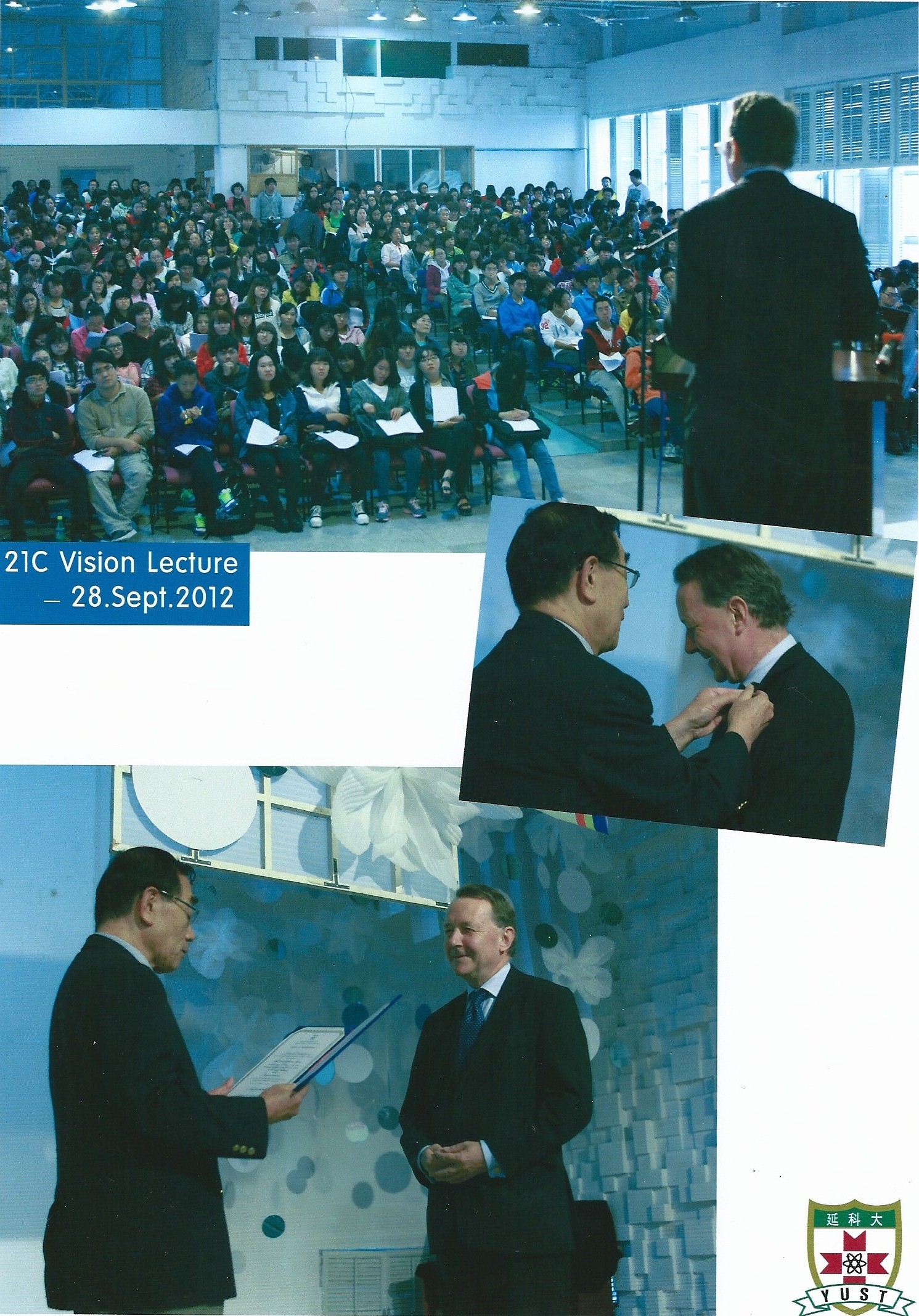
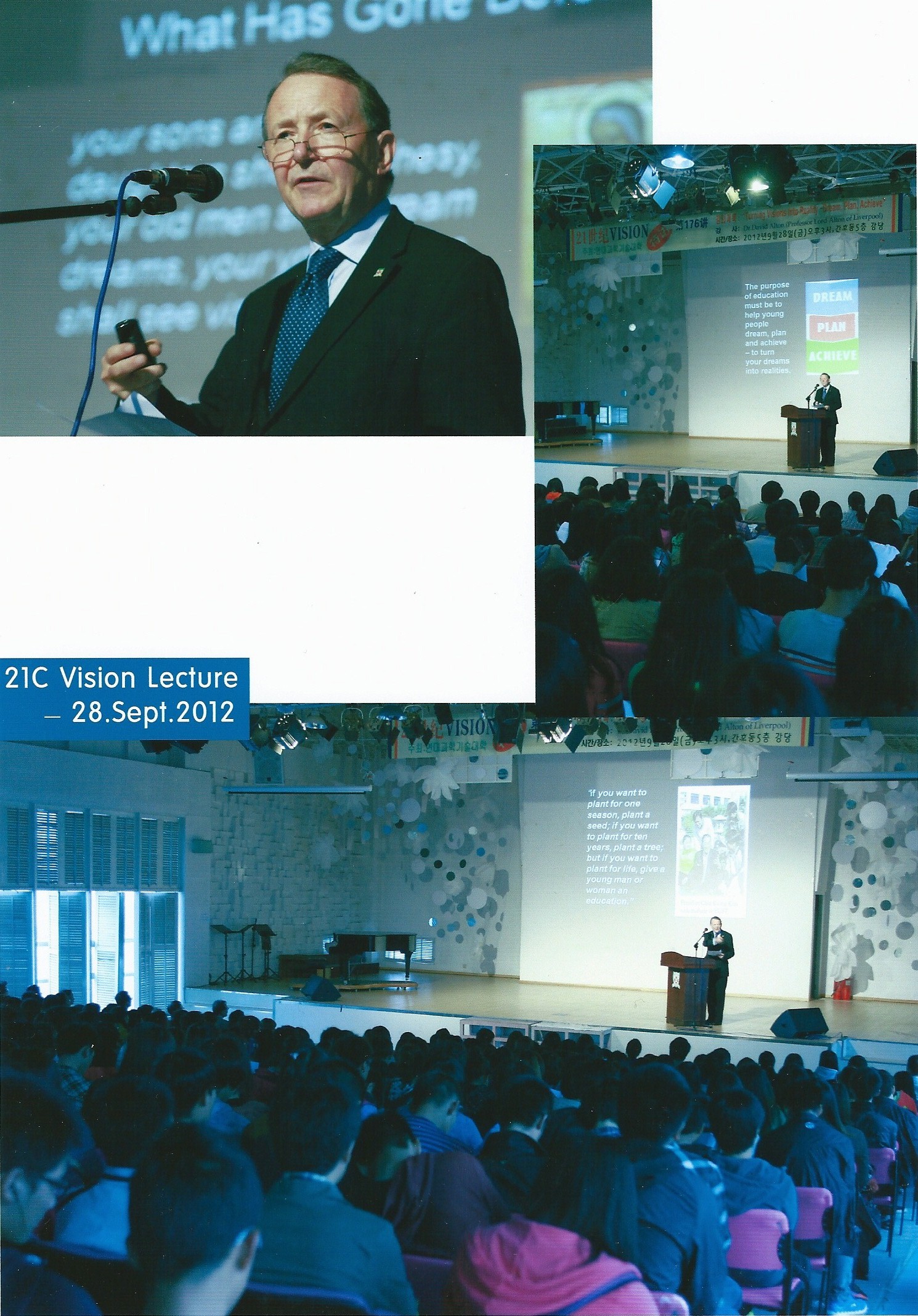
“Turning Visions Into Reality – Dream, Plan, Achieve.” Yanbian University of Science and Technology, Jilin, September 2012. Delivered on the 20th anniversary of the foundation of the university at Yanji in North East China.
https://www.davidalton.net/media/ – click here for power point presentation to accompany talk (scroll down list to Yanbian (YUST) Lecture.
http://www.ljmu.ac.uk/NewsUpdate/index_124527.htm
It is a great pleasure for me to be at Yanbian today at the invitation of your founder and President, Dr. James Kim – for whom I have the highest admiration.
Dr.Kim says “I believe in the power of education”– and so do I. Dr.Kim believes that “education can plant seeds of the values that are critical in reaching our desired end. These values include understanding; respect; sacrifice and reconciliation.” I believe that too.
We also both know the truth of the Chinese proverb that says “if you want to plant for one season, plant a seed; if you want to plant for ten years, plant a tree; but if you want to plant for life, give a young man or woman an education.”
The purpose of education must be – as my own university in Liverpool puts it – to help young people dream, plan and achieve – to turn your dreams into realities.
What Has Gone Before
Almost three thousand years ago, in the Book of Joel (2:28) comes the prediction that “your sons and your daughters shall prophesy, your old men shall dream dreams; your young men shall see visions.”
And in the Book of Proverbs (29:18) it states that “Where there is no vision, the people perish.”
What those sentiments anticipate is a generation of leaders who will speak with insight, have a clear vision of the future, govern wisely and act justly in both promoting the common good and in providing security and protection for their people.
Writing in the same millennium as Joel, Confucius offered sage advice about how anyone hoping to enter public life should first prepare:
“To put the world right in order, we must first put the nation in order; to put the nation in order, we must first put the family in order; to put the family in order, we must first cultivate our personal life; we must first set our hearts right.”
A similar thought was captured by Mahatma Gandhi who said: “You must be the change you want to see in the world”
The Nobel Peace Laureate and eighth President of South Korea, Kim Dae Jung, understood the importance of personal transformation as the preparation for political life. In his Prison Letters, he wrote that:
“We have to be reborn every day and make fresh progress every day. The object of our conquest is ourselves. We have to fight and conquer that self that is complacent, the self that tries to escape, the self that is arrogant and the self that is carried away by a single moment of success.”
For tomorrow’s leaders – that is your generation – facing today’s challenges – what Gandhi was signifying was the centrality of personal transformation.
Life Without Values
Without such change, political life can be a game of charades where its participants are seduced by the allure of power; where, in a Faustian Pact to obtain self advancement, they trade the principles they once espoused and the ideals they once embraced.
A key objective for tomorrow’s leaders must be the promotion of harmony: harmony in our world, between nations, between cultures, between beliefs, between mankind and the natural world. When we bring together of our thoughts, our words and our actions, that is harmony.
Harmony and Peace
The Asian belief in the centrality of harmony is something which the West needs to understand and embrace. In ancient Chinese Taoist thought all reality is determined by constantly changing relationships and by the harmonious complementarity of the two primal principles of Ying (the receptive, feminine, the earth) and Yang (the creative, masculine, heaven).
Hinduism sees the idea of ahimsa as pivotal. Ahimsa proclaims a rejection of the use of force and all that is harmful. For Mahatma Gandhi the ancient ahimsa was promoted as non-violence in all spheres of life including the political realm.
A second objective must be compassion and the promotion of peace.
For the Buddhist all life is suffering. But karuna – the concept of compassion in Buddhism – mitigates the suffering through an outpouring of compassion and encourages each encounter with humanity and nature to be based on loving-kindness.
For Jews the Hebrew word shalom (like the Arabic word salaam derived from the same word stem) has a more substantive meaning than the English word peace. Jews use the word as a benediction or a blessing and the implicit prayer that the person so greeted will reach a place of contentment, happiness wholeness and inner peace.
The New Testament develops this understanding of the Old Testament message of peace. Jesus’ nativity is proclaimed as peace on earth; God’s kingdom is to be the kingdom of peace and righteousness; the Beatitudes praise the peacemakers as blessed and Jesus intensifies this message through the command to love one’s enemies. The disciples are told to speak peace in the name of Jesus after His Resurrection He greets the disciples with the words:”Peace be with you!”
Without this inner peace, and inner calm, which so many of the world religions foster, it is not possible to promote peace among the nations or within a nation; or to forestall chaotic anarchy and conflict. But, once you have experienced this inner pace and inner harmony the challenge is to take it into the service of the world.
Service Not Power
Political life should revolve around the concept of service, not power.
Politics needn’t be a dirty game of power hungry self-seeking, personal gain, manipulation and deceit. If it does become an avaricious dirty game it will be because those who are playing it do not have clean hands. Politics is only as good as the people who enter it; only as good as their vision; only as good as their conduct. The quality of what they do will depend on their willingness and capacity to become the change they wish to see in the world.
The sophistry is sometimes offered to the aspiring politician that, if only they can climb a little higher up what the nineteenth century British Prime Minister, Benjamin Disraeli described as “the greasy pole” of politics (“I have climbed to the top of the greasy pole”), and then they will be in a position to change things. But, by then, usually, the only thing which has changed is the would-be leader him or herself – and not in the manner which Ghandi had in mind. If they have failed to master themselves, the effect of power on an individual can be disastrous.
Politics As A High Calling
Aristotle, the author of the classical work “Politics”, saw political leadership as a high calling and the father of democracy held that shame would attach to those who refuse to play their part.
Aristotle insisted that that everyone should pursue virtue and work for the common good – koinonia – a rich word which implies active participation, common unity, relationships and sharing of gifts.
Koinonia is not about constitutions or civic structures of government but about the qualities in mankind which made civic co-existence a possibility. It is about our inter-connectedness with Aristotle writing in “Politics” we are “not like solitary pieces in chequers”.
The Ancient Virtues
Aristotle’s ancient virtues remain for me the key to building a civil society:
Justice
Wisdom
Temperance
Courage
Magnanimity
Tolerance
Munificence
Prudence; and
Gentleness
But these were not theoretical qualities. Koinoinia requires action and through engagement and deeds we both learn and change.
From Virtue To Action
Let me give an example from British history of one man who entered political life and who, although he never became Prime Minister or the leader of a political party, made a profound difference to the koinonia – to the common good.William Wilberforce lived from 1759 to 1833 and entered Parliament as the youngest MP. Wilberforce was motivated by his religious beliefs but once said that “A private faith that does not act in the face of oppression is no faith at all.”
He identified the slave trade – traffic in human beings, sold for profit into lives of abject misery – as the greatest humanitarian cause of the day. For forty years he dedicated himself to the abolition, first, of the Trans Atlantic slave trade and then to slavery itself. When he was on his death bed he was finally brought the news that the law had been changed by Parliament and that the trade had been abolished.
By and large, those who led the campaign for abolition of the trade were men and women of deep religious conviction, notably the Quakers, Thomas Clarkson, Granville Sharpe, Olaudah Equiano, Josiah Wedgewood – who created the medallion “Am I Not a Man and Brother”, John Newton, the Liverpool ship’s captain and slave trader who changed his mind and last composed “Amazing Grace” – the Liverpool MP William Roscoe and William Wilberforce himself.
Estimates of the numbers of Africans sold into slavery vary but over nearly four centuries about 12 million people were forcibly transported into bondage.
Between 1701 and 1810 around 5.7 million people were taken into slavery, 2 million coming from the Slave Coast, where Benin is situated. Around 39% went to the Caribbean, 38% to Brazil, 17% to South America and 6% to North America.
Many of the slaves shipped out of Africa from the Bight of Benin were taken to the port of Ouidah, which is situated near Cotonou, the present capital and which I visited .Not since I visited the holocaust memorial at Yad Vashem in Israel had I experienced such harrowing emotions.
In the total Atlantic trade, British ships are estimated to have made 12,000 voyages and to have carried 2.6 million slaves.
In his Journal of a Slave-trader, John Newton wrote: “I have no sufficient data to warrant calculation but I suppose not less than one hundred thousand slaves are exported annually from all parts of Africa, and that more than one half of these are exported in English ships.”
The last letter written by the great John Wesley was to Wilberforce and asked “what villainy is this?” which allowed the enslavement of Africans. Wesley told Wilberforce to put his trust in God and to work for an end to such evil – “a scandal of England of religion and of human nature.”He told him to be a force for change and an “Athanasius contra mundum” – literally to be like the 4th century Christian Bishop, Athanasius, “Athanasius against the world.” Take a stand: be willing to pay a price. Take on the whole world if necessary. Be a sign of contradiction.
What We Can Learn From Wilberforce
Wilberforce’s story has great relevance to anyone interested in entering public or political life. His was the first great campaign for human rights and human dignity. It involved painstaking research; the production of newsletters and leaflets; fundraising; the creation of logos and eye-catching public awareness; posters; press reports; public meetings; marketing and publicity; lobbying; petitions; boycotts; and parliamentary and political action at every level.
Wilberforce needed persistence – it took 40 years – and tempted though he was, he didn’t give up at the first discouragement and defeat. He couldn’t have done it by himself – it needed coalitions and alliances. It needed intelligence and passion. He invoked the importance of combining pressure and prayer. Wilberforce identified a priority – what he believed to be the greatest injustice and a cause to which he should give his life in political service and he made it his chief concern – rather than the gadfly’s approach, jumping from one fashionable or faddish cause to another.
The Relevance Of This Story For Today
If we want to put principles of common humanity and the pursuit of the common good into practice today we should first identify the cause to which we should devote ourselves. For some it will be the freeing of people’s held in oppression; for others it will be the safeguarding of the created world; for others it will be standing up for the dignity and sanctity of human life or opposition to the capricious use of capital punishment, arbitrary detentions or corrupted legal processes; for some it will be the championing of people with disabilities, or a despised minority, or an economically or socially disadvantaged group; for others it will be holding leaders to account, opposing corruption, working for democracy or freedom of expression, belief or conscience.
Wilberforce once said “If to be feelingly alive to the sufferings of my fellow-creatures is to be a fanatic, I am one of the most incurable fanatics ever permitted to be at large.”
If he were here today he would return to the cause of the suffering of his fellow creatures and to the question of slavery. Consider the following:
- 27 million people enslaved today
- ILO say this includes 8.4 million children
- 700,000 trafficked every year
- Debt Bondage affects 20 million people
- Forced labour, child labour, economic servitude, racially motivated and caste based slavery all still persist throughout the world At least 12.3 million people are victims of forced labour worldwide
- 80% of the 700,000 people trafficked annually are women and children
- Human trafficking is the third largest source of income for organised crime (after arms and drugs)
- Trafficking generates an average of $7 billion per year: one year it was put at $32 billion
The popular myth is that slavery is a thing of the past, but more people are trafficked today than were enslaved in the entire history of the Transatlantic Slave Trade. Most people assume that the slave trade was long since consigned to the dustbin of history by William Wilberforce.
In reality the trade in human beings is a rapidly growing scourge that affects countries and families on every continent.
Those trafficked may be forced into prostitution or to work as domestics, as labourers, or market traders and in a variety of other jobs. Recent research suggests that, at an absolute minimum, hundreds of women and children are being trafficked into the UK each year.
The UN believes it is the second largest criminal activity in the world, second only to drug smuggling; that it nets $36 billion a year to the traffickers; and that 100,000 Modern Day Slaves are trafficked around the European Union each year.
. People have been transported into many forms of slavery and not from choice.
They include children who are pawns in debt bondage whose alcoholic or drug dependent parents get a lump sum payment from traffickers to take their children to London or other cities to ‘educate them’. In fact the education is in how to commit ATM theft, pick-pocketing and shop lifting.
Then there is sex trafficking. Girls mostly, with threats of violence to themselves and their families if they try to escape or keep money from their ‘clients’ (2,200 brothels in London alone); and the cannabis factory boys – many brought in from Vietnam.
Of the 15,000 domestic workers coming to Britain a year, approaching 700 are likely to have been abused in some way.
Without political pressure from the highest level, fighting human trafficking will continue to be a low priority for the police. If the police find a gang that deals with arms or drugs, they are likely to be dealing with human trafficking as well. The criminal gangs are sophisticated, flexible, and not short of money. Demand and abuse go hand in hand. There is big money to be made by trading in people who – unlike drugs or arms – are recyclable.
Human Rights, Human Life, Human Dignity
But human rights abuses come in many forms and closer to home, in China there will be situations crying out for a twenty first century William Wilberforce- champions of human dignity, of good ethics, of the safeguarding of precious resources, of the principle of duty, and many other noble and good causes which promote the common good. Your task is to find the cause which needs you to champion it.
While you are students at YUST you must be equipped to reach beyond academic attainment. Young people must have the opportunity to think, enquire, debate and understand how decisions will affect their lives and the future of their nation. They need to have lain before them potential ethical dilemmas, moral conundrums, technological and scientific challenges, the rapidly changing pace of living – and world crises, ranging from hunger, to global warming, to the exploitation of finite resources.
Education of the citizen must above all underline the moral significance of self-knowledge – as agents in the way we live and affect others. We need citizens who embrace the idea of individual moral responsibility for their actions.
Unless we are able to conceive of ourselves as an agent or agents with regard to how we behave, it will be impossible to develop any sense of responsibility or judgement in the way in which we use science.
Gaining that sense is important, for it is often the case that a new scientific discovery can be put to good, ethical uses that can improve our lives, but will also have more sinister, unethical applications that will cause harm. In other cases a technology may be clearly beneficial in principal, but must be deployed with care, lest unintended side effects end up doing more harm than good. This is why it is important that the next generation of scientists are given a good moral education, so that they can be mindful of and differentiate between the different applications of their work, and carefully consider the ethical implications of the discoveries they make.
Let me give one example of what I mean.
In the last few decades, climate change has become a serious issue for the international community. The overwhelming scientific consensus is that the planet is changing in ways that will adversely affect lives everywhere, but particularly those in less well developed countries, such as the equatorial African states where droughts are set to increase in frequency – we need only consider the events of this year, where many lives have been lost in countries like Somalia and Ethiopia in the Horn of Africa – where I have travelled – to understand the devastation this will cause – or the island nations of the Pacific, who could be swallowed up by the ocean entirely if sea levels rise as many scientists predict they will. Make no mistake, this is an issue that respects no borders and that all nations ignore at their peril.
Climate change is an unfortunate side-effect of the industrial age, a product of our short-sightedness in seizing short term benefits at the expense of the future. But just as it arose from the products of scientific progress, so the answers will come from the scientific community and from your generation. But you must always guard against corruption and the debasing of ethics.
It is a sobering thought that more than half of the participants at Hitler’s 1942 Wannsee Conference, which planned what was called “the final solution to the Jewish question” – that is the extermination and murder of Europe’s Jewish people – were either medical practitioners or in receipt of other academic doctorates. Nazi collaborators included a cast of scientists, doctors, judges, lawyers, philosophers and academics. It’s so very easy to be corrupted.
In other cases, scientists may feel that what they are doing will lead to a useful outcome – a new treatment, a better understanding of the disease. Yet this does not mean that all methods are acceptable.
The seductive scientific argument that “if only” you would permit us to do this or that experiment we might make any number of useful discoveries gets dangerously close to a form of blackmail. It relies on the old canard that the end will justify the means; that unethical experiments may be used for seemingly ethical reasons. There is also an assumption that modern man is far too sophisticated and far too decent to fall into the sort of monstrosities characterised by the Nazi scientists. Yet, history teaches us that vain gloriousness and hubris attended by vanity and conceit are often the trump cards when men seek to justify their unethical actions.
So, you need to be champions of change whilst preserving the highest ethical standards and ideals. Nothing in science – whether it be physics, cosmology, evolutionary biology or neuroscience – can lead to the conclusion that the universe is bereft of meaning or intelligence or that we can be other than guardians and custodians during our brief sojourn on our small part of this great creation.
Einstein asserted that misuse of science could only be countered “by those who are thoroughly imbued with the aspiration toward truth and understanding. …I cannot conceive of a genuine scientist without that profound faith.”
The first words of the Confucian classic, “The Great Learning”, says that “The way of great learning consists in manifesting one’s bright virtue, consists in loving the people, consists in stopping in perfect goodness.”
That love of the “the great learning” at the service of humanity should inform all that you do at YUST and inform your lives as you seek to turn your visions into reality and to change the world.
Let me draw to a conclusion.
Change doesn’t just happen by itself; and it may come at a price.
Change Doesn’t Happen By Itself
As a teenager I felt especially challenged by the killing at Memphis on April 4th 1968 of Dr. Martin Luther King, then aged 39, who five years earlier had given his landmark speech – “I Have a Dream” – in which he described the American Constitution and Declaration of Independence as a promissory note:
“A promise that all men, yes, black men as well as white men, would be guaranteed the “inalienable Rights” of “Life, Liberty and the pursuit of Happiness. It is obvious today that America has defaulted on this promissory note, insofar as her citizens of colour are concerned.”
Fundamental change in the USA, Europe, and in South Africa’s apartheid regime – how we view colour and race – was ushered in by King’s sacrificial entry into political life. But he understood the price that would be paid to bring change:
“Change,”he said, “does not roll in on the wheels of inevitability, but comes through continuous struggle. And so we must straighten our backs and work for our freedom. A man can’t ride you unless your back is bent.”
Those who believe that politics is about grandstanding, sound-bites, personal aggrandisement, the pursuit of power, or a charmed life will rarely develop King’s bent back but nor will they have the satisfaction of bringing an idea or a great cause to birth.
Two months after Dr.King’s assassination Robert Kennedy also paid the ultimate price in championing civil rights and opposing racial segregation. Kennedy’s religious faith led him to a profound belief in the importance of individual actions, that each of us is made in God’s image (Imago Dei), is, therefore, of inestimable worth, and that we should neither be discouraged by seemingly impossible odds or by the intractable nature of the challenges we face:
“Let no one be discouraged by the belief there is nothing one person can do against the enormous array of the world’s ills, misery, ignorance, and violence. Few will have the greatness to bend history, but each of us can work to change a small portion of events. And in the total of all those acts will be written the history of a generation.” (Robert Kennedy).
Looking at the world today, there are no shortage of great challenges: – 800 million people racked by starvation or despair, living below any definition of human decency; at egregious violations of human rights, from Iran to North Korea – where I have travelled several times; famine in Somalia and the Sahel; unspeakable violence in Syria and Nigeria, Congo and the Sudan; and at the domestic challenges in Britain which I describe in a lecture entitled “The Condition of England Question”, which include 1 million young people not in education, employment , or training, and over 2.6 million without work – a 17 year high in a flat-lining economy and 1 million elderly living in toxic loneliness who don’t see a friend or a neighbour during the course of a typical week.
We can very easily overawed – like the boy in Louis Stephenson’s rhyme who is dejected by the one-damn-thing-after-anotherness of life and despairs that “the world is so big and I am so small I do not like it at all at all”. As Mother Teresa of Calcutta once said: “In this life, we cannot do great things, we can only do small things with great love.”
I often remark that we are not great boulders but small stones – and that it is small stones that must first move for a landslide to happen. To take up this challenge, as Gandhi had it, we must become the change that we desire to see; and be encouraged by Winston Churchill’s observation that “to improve is to change; to be perfect is to change often.”
Politics should always be a campaign of service where the love of power is replaced by the power to love. Politics should always be about service not self-seeking; virtue not vanity; speaking up for the powerless, not narrow partisanship; respectful of opponents, not the silencing of dissent; tolerant of difference, not the crushing conscience and not blindly accept the dog whistle of people who want you to follow them.
A Price To Be Paid
There may also be a price to be paid if you commit yourself to political service. Think of Kim Dae Jung’s years in prison. In the end he was not executed but political leaders may well have to pay the ultimate price.
Think of the fate, 18 months ago, of Pakistan’s Minister for Minorities, Shahbaz Bhatti and the Punjab’s Governor, Salman Taseer. One was a Christian, the other a Muslim. They stood together in opposing prejudice, terror and intolerance. Both were murdered.
Bhatti sensed the almost inevitable consequence of his courageous words and actions.
He said that his stand would “send a message of hope to the people living a life of disappointment, disillusionment and despair” adding that his life was dedicated to “the oppressed, the down-trodden and the marginalised” and to “the struggle for human equality, social justice, religious freedom and the empowerment of religious minorities’ communities.”
The story of Shahbaz Bhatti is a one which should inspire us all. He was called to a political life and in the end he laid down his life for his friends: standing against a world which he knew to be unjust and which needs to change.
Shahbaz Bhatti life and death reminds us that change comes at a price. John Henry Newman captured this though when he reflected that:
“Good is never accomplished except at the cost of those who do it, truth never breaks through except through the sacrifice of those who spread it.”
Like Dr.King and Robert Kennedy or Kim Dae Jung, Shahbaz Bhatti sacrificed himself for his beliefs and in the service of others. Like Gandhi, his own life represented the change he wanted to see. Most of us will never be called upon to make the supreme sacrifice but let us never forget Aristotle’s warning that shame will attach to those who refuse to play their part; and that evil triumphs when good men and women do nothing. As Dr.Martin Luther King once observed: “Our lives begin to end the day we become silent about things that matter” while Dietrich Bonheoffer, who died at the hands of the Nazis warned that “Silence in the face of evil is evil itself.”
So, to turn today’s dreams into tomorrow’s realities you will need courage and determination; you may need to go against the tide; to speak out and behave with intelligence and compassion.
You will need to cherish your dreams: to dream; to plan; and then to achieve. I can think of few places where you will receive a better preparation to meet those challenges than Yanbian University of Science and Technology.
Professor Lord Alton of Liverpool is Professor of Citizenship at Liverpool John Moores University and has served in both Houses of the British parliament for the past 33 years. 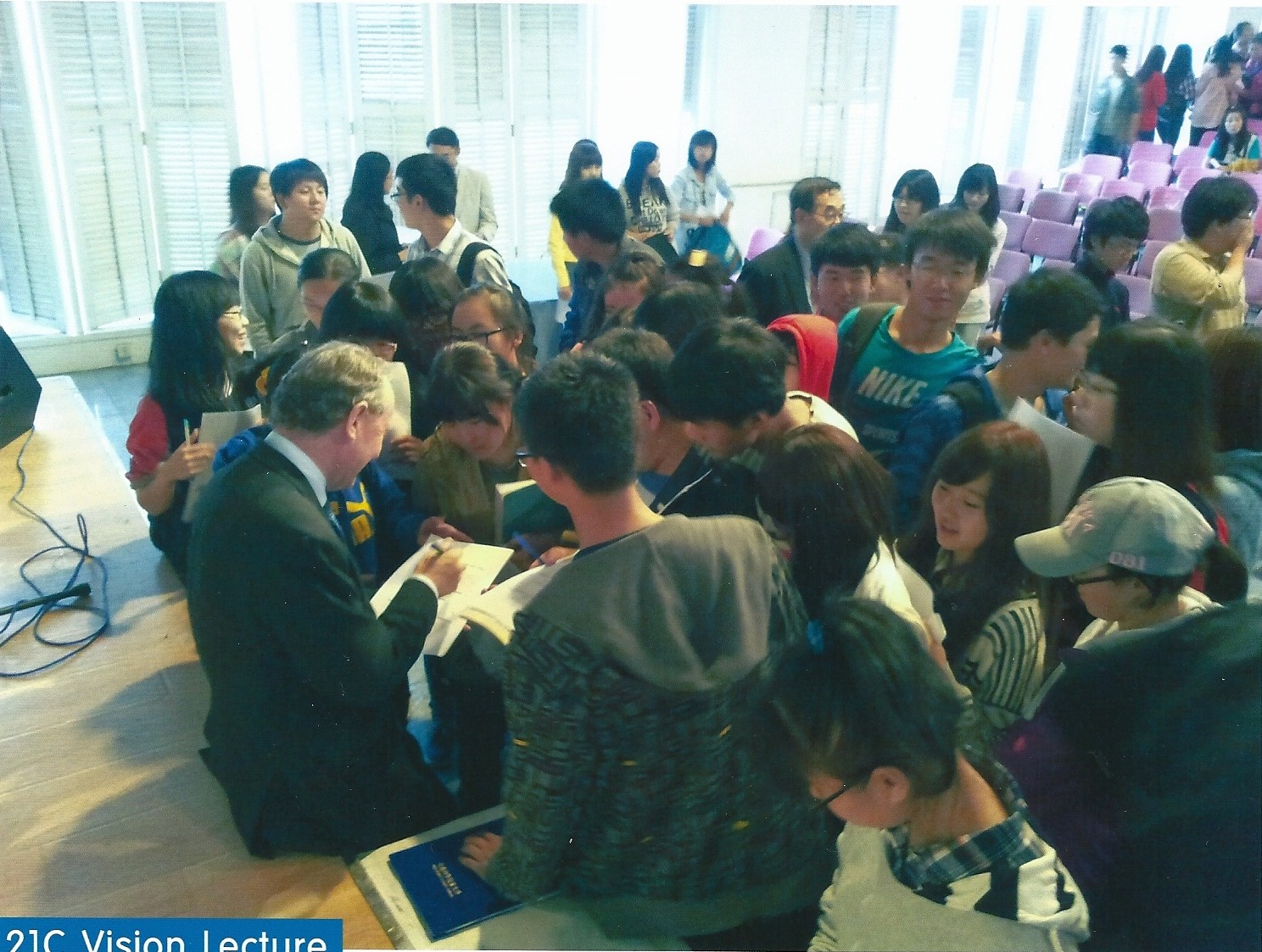

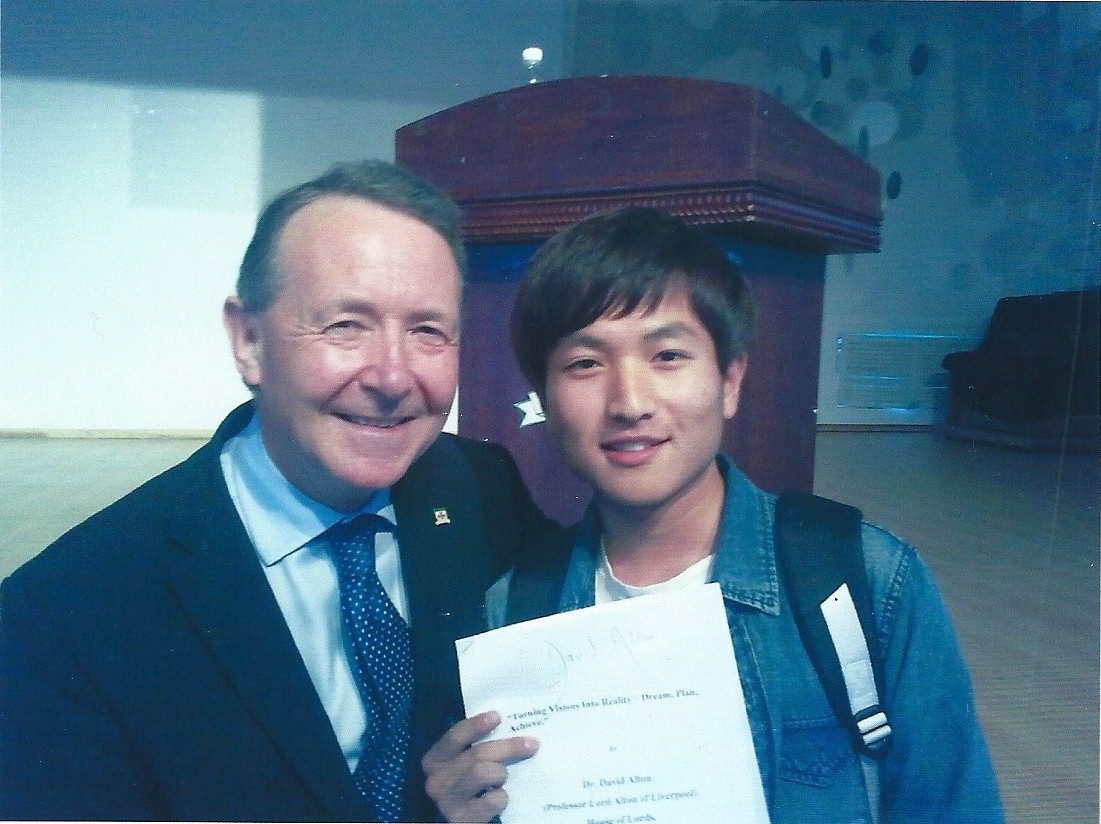
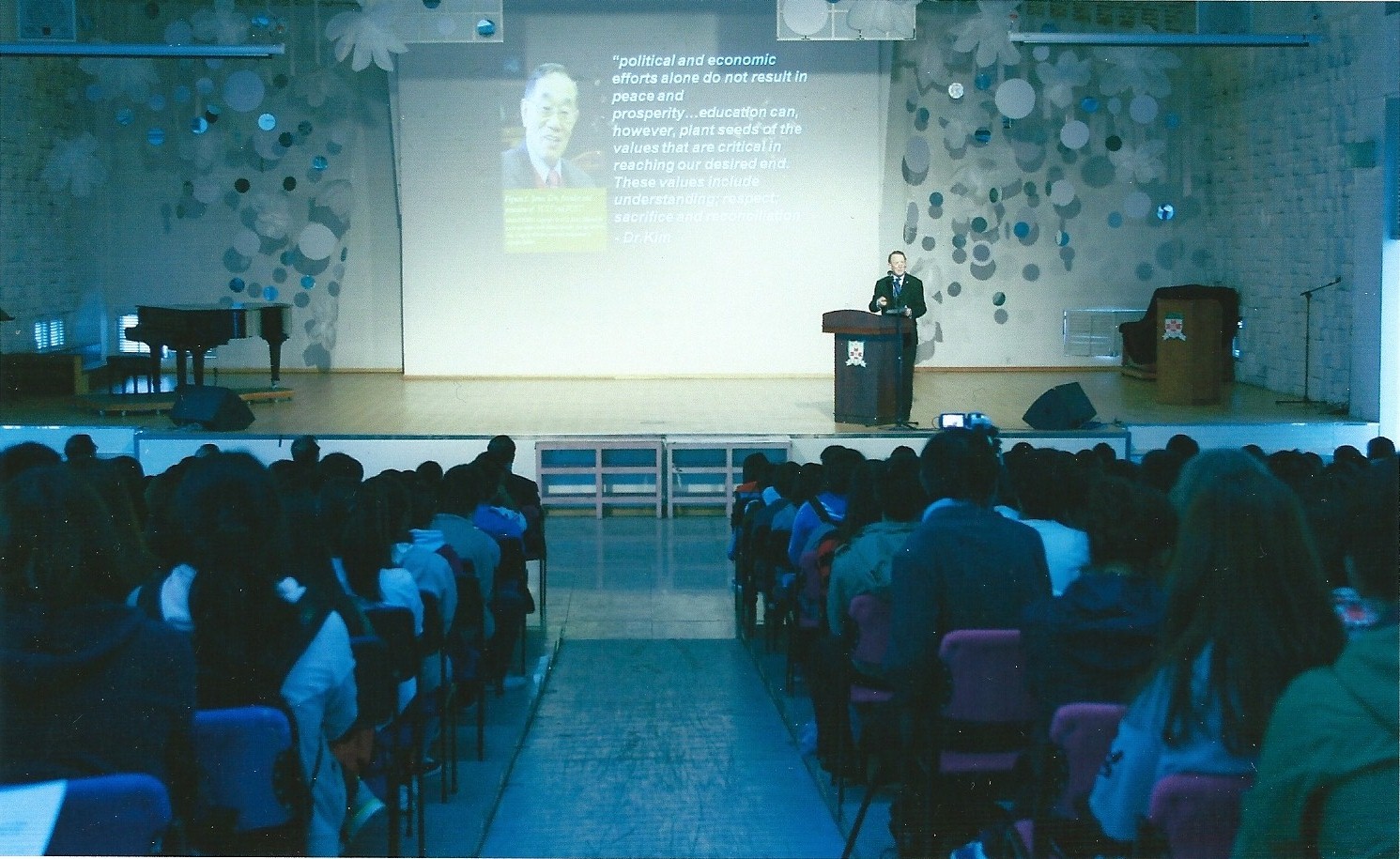
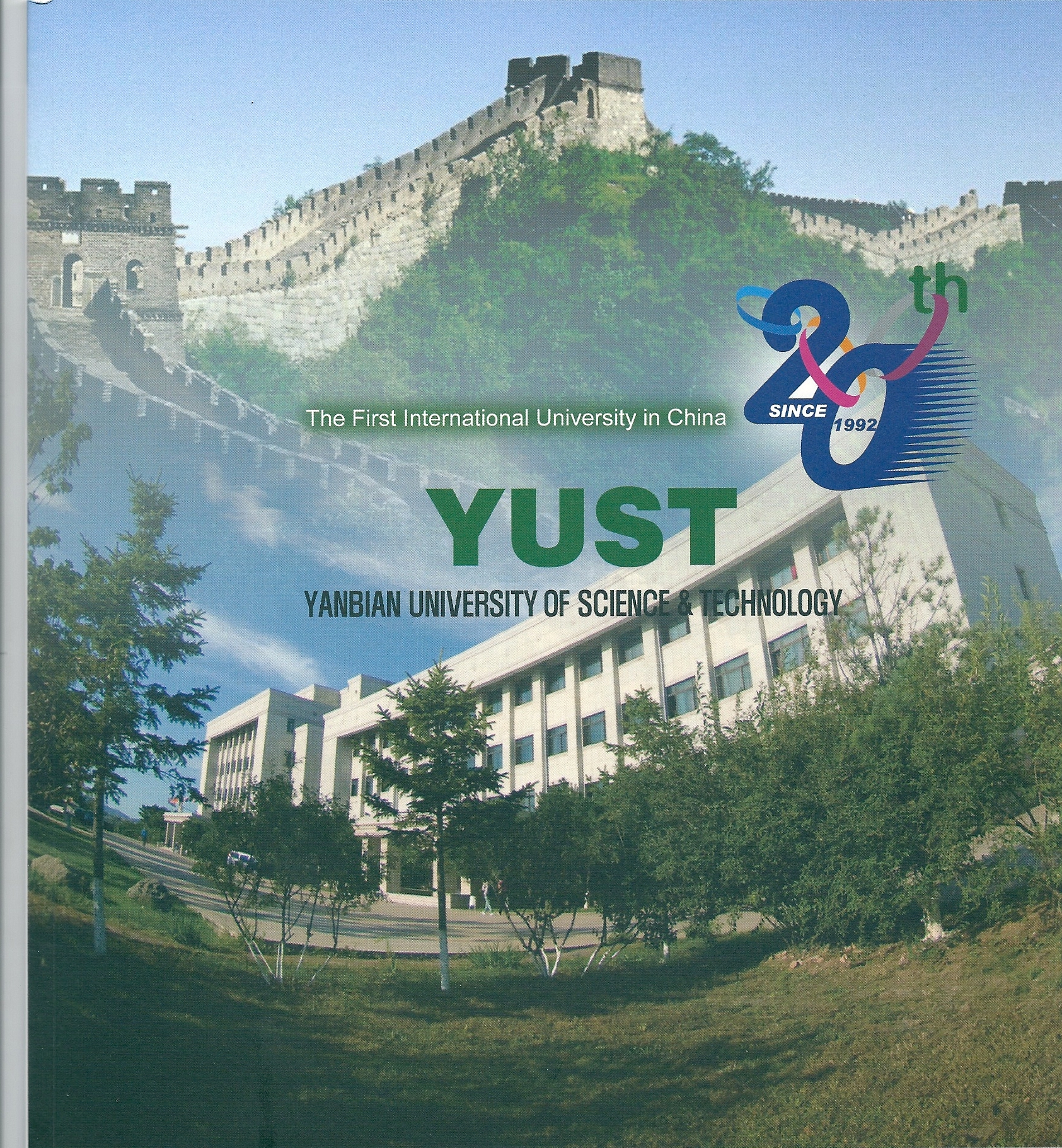

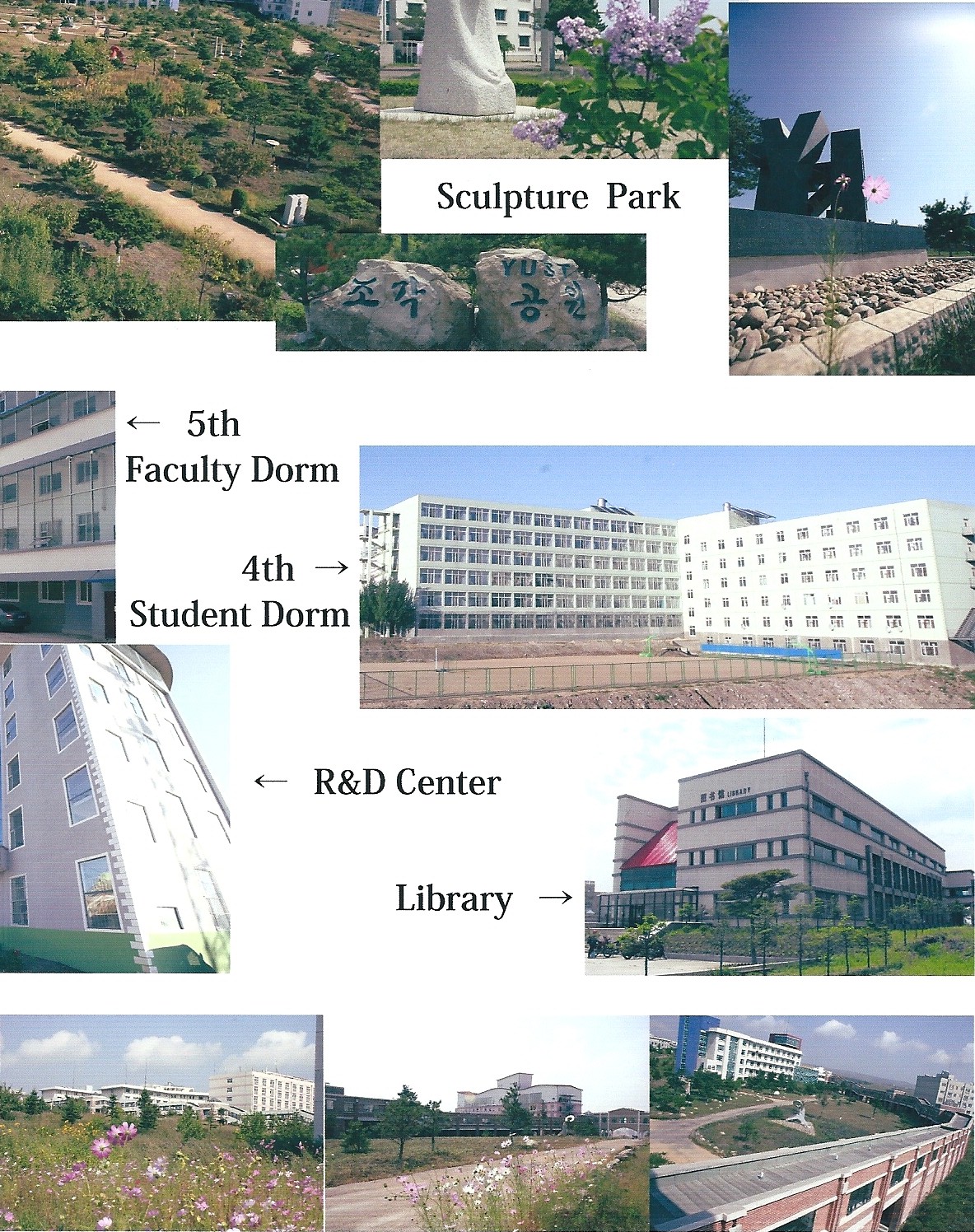
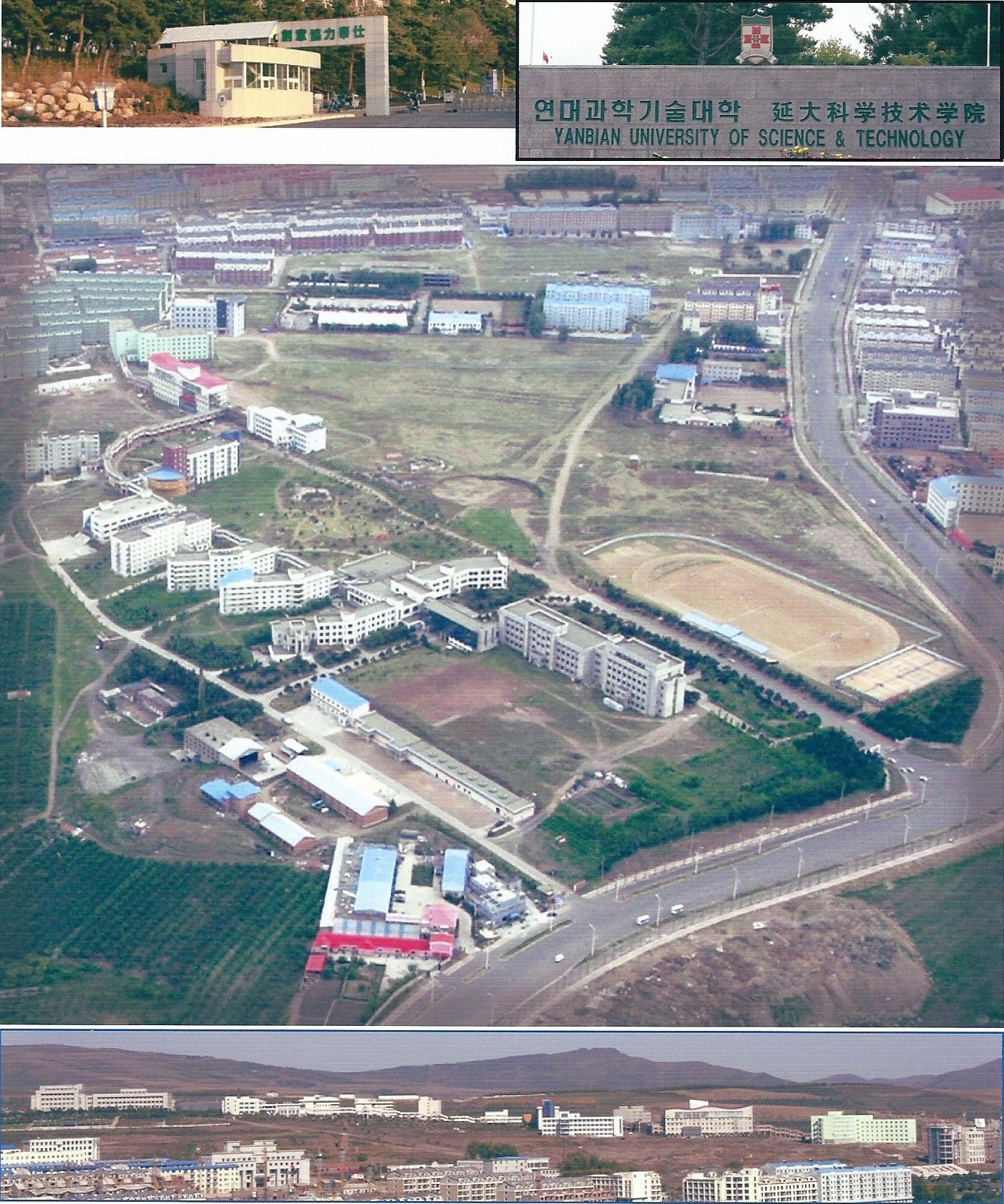 https://www.davidalton.net/2011/10/14/report-on-the-first-international-conference-to-be-held-at-pyongyang-university-of-science-and-technology-and-how-the-university-came-into-being/
https://www.davidalton.net/2011/10/14/report-on-the-first-international-conference-to-be-held-at-pyongyang-university-of-science-and-technology-and-how-the-university-came-into-being/

